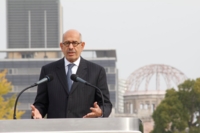Participating laureates
Lech Wałęsa Polish politician and labor activist. He was one of the leaders of the workers' mobilization of 1980 and president of the "Solidarity" union during the communist period. Their struggle focused on improving the political and economic conditions of the working class. He was awarded the Nobel Peace Prize in 1983 for his work to solve the nation's problems through negotiations and working together without violence and became president of Poland in December 1990. | Óscar Arias Sánchez Costa Rican politician who assumed presidency of his country in 1986, a critical period for Central America due to the conflicts that were developing in countries like Nicaragua and El Salvador. He worked on structuring a peace plan for the region, known as "Plan Arias," signed by all Central American presidents on August 7, 1987. The consolidation of the peace process earned him the Nobel Prize in 1987. | |
Rigoberta Menchú Tum Indigenous Guatemalan. She was a victim of discrimination and devoted her life to peacefully combating attacks on the indigenous population. She was awarded the Nobel Peace Prize in 1992 for her fight against inequality and her role as an advocate for the rights of indigenous communities and women. | José Ramos-Horta José Ramos-Horta, from exile, endorsed the resistance movement of East Timor and managed before the United Nations-UN, the approval of a resolution to support the independence of his country. He was the first Foreign Minister of East Timor and later served as Prime Minister (2006-2007). He would later become President (2007-2012). Ramos-Horta received the Nobel Peace Prize in 1996 for their work to achieve a fair and peaceful settlement of the conflict in East Timor. | |
Jody Williams American human rights activist. She fought for the eradication of antipersonnel mines and cluster bombs. She was awarded the Nobel Peace Prize in 1997 for her leadership in the formation of the International Campaign to Ban Landmines, whose work was consolidated with the signing of the Ottawa Treaty in 1997. This treaty prohibits the use of anti-personnel mines. | David Trimble Northern Irish lawyer and politician. After several years of political radicalism, he supported and promoted the peace talks between London and Dublin, which gave way to a referendum to give Northern Ireland political autonomy. In 1998 he received the Nobel Peace Prize, along with the Catholic nationalist leader John Hume, for his work for the construction of a new and peaceful Ireland. | |
Shirin Ebadi Iranian lawyer and human rights defender. She was one of the first women to be a judge in her country and has been in exile since the Islamic revolution. Ebadi founded the Association for the Support of Children's Rights and provides free legal advice to persons accused of political, ideological and religious motives. She was awarded the Nobel Peace Prize in 2003 for her work on democracy and human rights, especially for women and children. | Mohamed El-Baradei Egyptian diplomat, jurist and politician. Between 1997 and 2009 he was the General Director of the International Atomic Energy Agency (IAEA), an intergovernmental organization under the auspices of the United Nations. He also served as interim Vice-President of Egypt from July 14, 2013 until the 14th of the following month, at the beginning of the military dictatorship in the country. On October 7, 2005, he won the Nobel Peace Prize together with the IAEA in “recognition of his efforts to prevent the proliferation of nuclear weapons”. | |
Leymah Gbowee Liberian activist in charge of organizing the Peace movement that put an end to the second Liberian Civil War in 2003. This led to the election of Ellen Johnson Sirleafen of Liberia, the first woman president in an African nation. On Friday, October 7, 2011 Gbowee received the Nobel Peace Prize along with her compatriot Sirleaf and yemeni Tawakkull Karman. | Tawakkul Karman Yemeni journalist, known as the "iron woman" or the "mother of the revolution". Directs the "Women journalists without chains" movement, which promotes the defense of human rights; Freedom of opinion and expression, and democratic rights. She was awarded the Nobel Peace Prize in 2011, along with Liberian President Ellen Johnson Sirleaf (first democratically elected African president) and Liberian activist Leymah Gbowee, leader of a Christian and Muslim Women's Movement. | |
Kailash Satyarthi Since the 1990's he has worked actively with the Indian movement against child labor. Their organization, Bachpan Bachao Andolan, has released more than 80,000 children from various forms of slavery, helping to make reintegration, rehabilitation and education possible. He won the 2014 Nobel Peace Prize along with Malala Yousafzai “for his fight against repression of children and young people, and for the right of all children to education”. | Juan Manuel Santos Economist, Business Administrator and Journalist, he is the current President of Colombia, he was elected in 2010 and reelected in 2014. He has served as Minister of Defense during previous governments. In 2016 he was awarded with the Nobel Peace Prize, for his resolute efforts to bring the country´s more then 50- year-long-civil war to an end. | |












